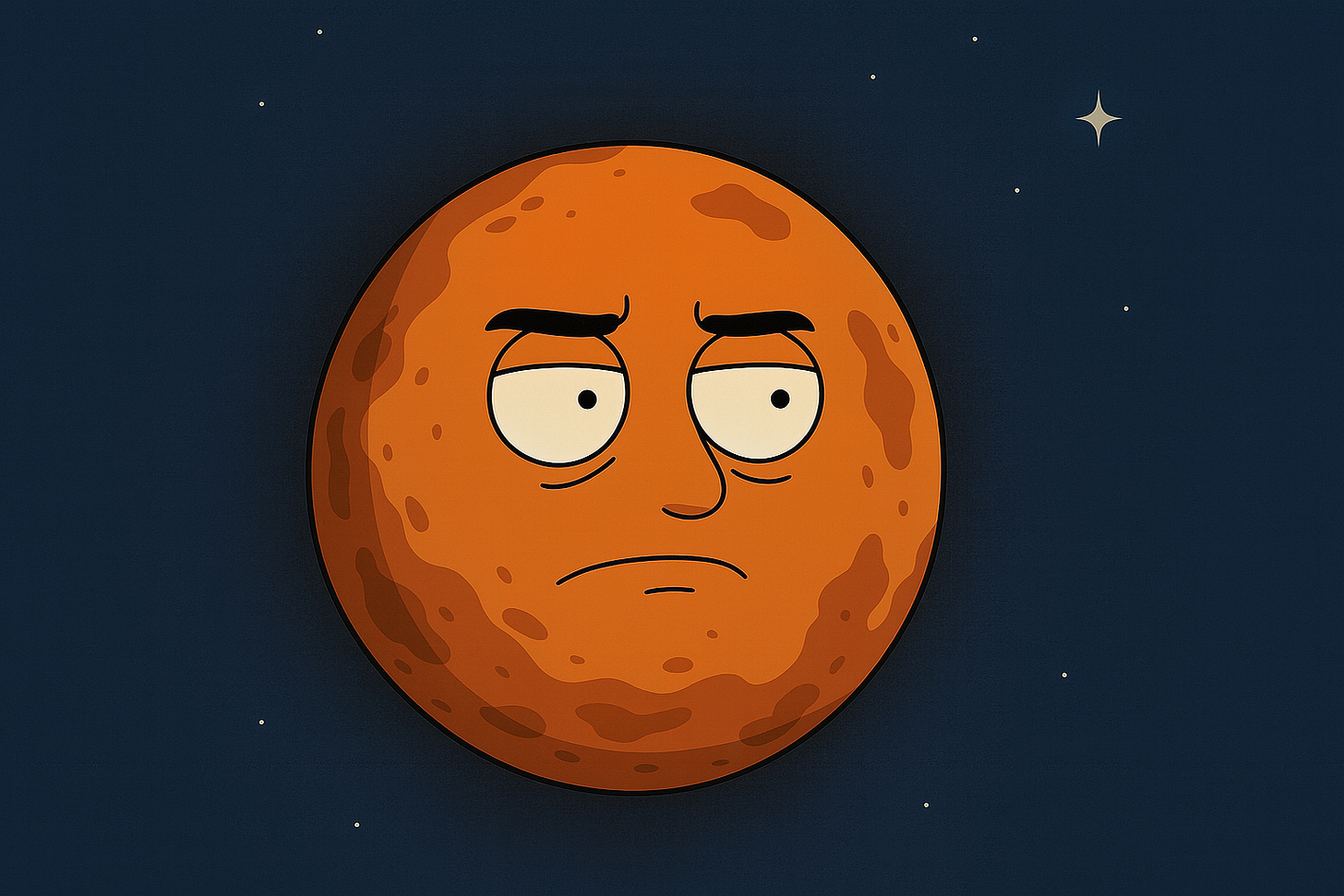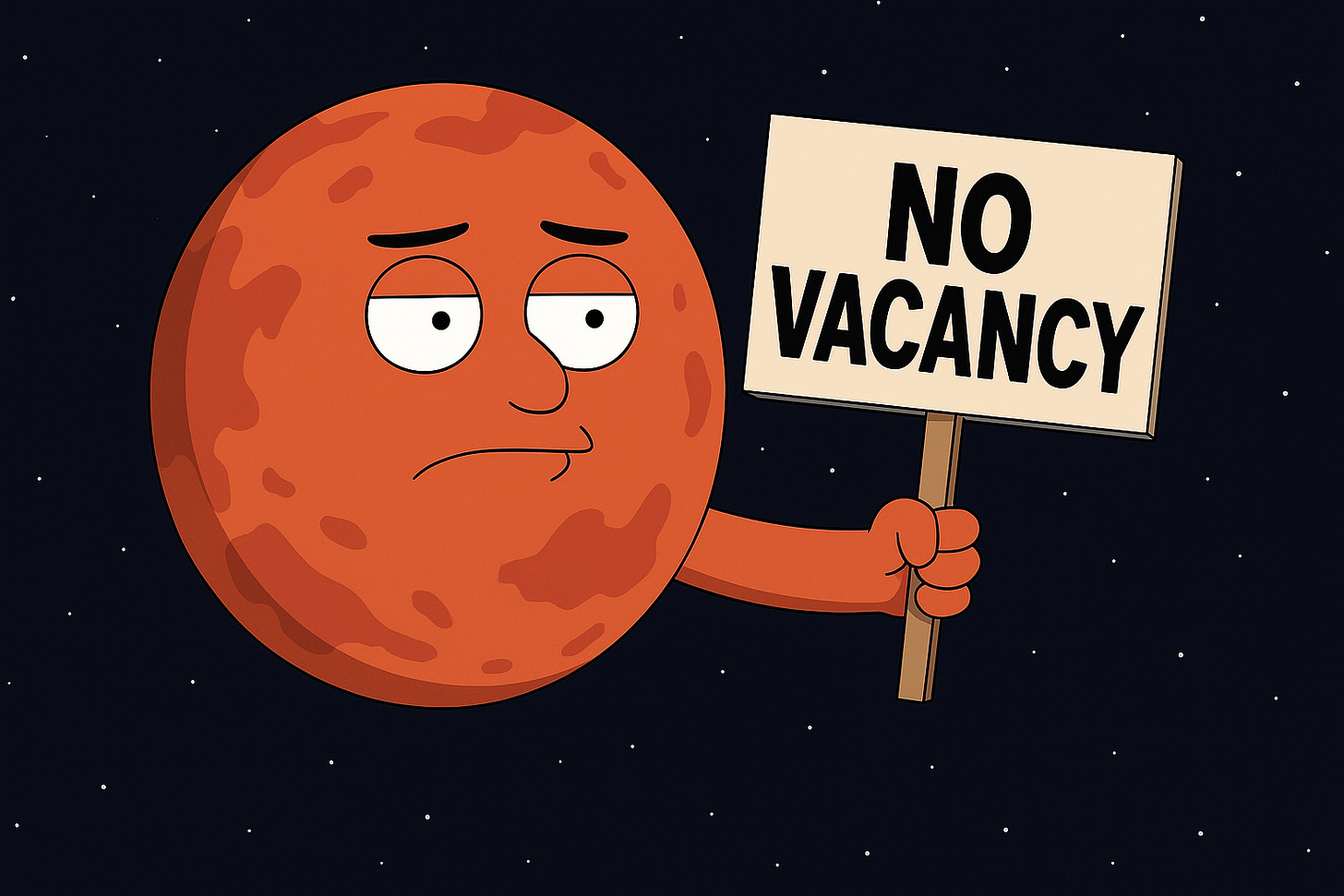Opinion: AI to Mars? The Dumbest Smartest Idea That Might Just Work
Because fixing Earth is yesterday’s problem.
Mars. The red rock of dreams, delusions, and Matt Damon growing potatoes in poop.
Humanity’s longest long-distance relationship. For over a century, we’ve fantasized about ditching this beautiful blue marble for something a little more… dusty.
Cue the Elon Musk memes, retro sci-fi posters, and every “What if we colonized Mars?” podcast ever recorded by a guy with red curtains.
And now, because we apparently weren’t juggling enough existential dread on this planet, we’ve decided to throw AI and Mars into the mix. Two of the most overhyped buzzwords in modern civilization… now being pitched as a package deal. It sounds like a bad startup pivot:
“We’re like OpenAI, but for terraforming.”
But here’s the thing… what if it’s not a joke? What if AI really is the secret ingredient? Not just for helping us survive the journey, but for helping us ask the weird questions we haven’t thought of yet?
That’s where this little brain-buster of a collab comes in. JT from The AI Rabbit Hole is handling the serious business of not dying in a floating metal coffin. I’m here for the weird shit. The ethics. The culture. The simulation theory detour you didn’t ask for. Together, we’ll take you on a two-part journey into the dumbest smartest idea humanity’s ever had: sending people to Mars.
Strap in. It gets bumpy. JT, you’re clear for lift off…
Step 1: Don’t Die
Getting to Mars isn't the hard part. You just point a giant metal tube at the sky and light the fuse.
The hard part is the seven-month, 140-million-mile road trip through a vacuum that actively wants to kill you, all while trapped in a glorified tin can with four other people, who will inevitably start getting on your nerves.
For decades, the answer to the thousand ways to die on Mars has been “more checklists.” But what if we outsourced the business of not-dying to a machine?
We’re not talking about a malevolent, HAL 9000-style overlord. We’re talking about specialized, brutally efficient AI that handles the cold, hard logistics of survival so the humans can focus on not going insane.
First, there’s navigation. An AI-driven mission planner serving as a cosmic chess master, constantly running billions of simulations to find the optimal trajectory. It calculates fuel consumption, factors in solar flares, and dodges space junk that could turn the spacecraft into a fast-moving colander. While human controllers drink stale coffee, the AI runs a million versions of the trip to find the one path where you don’t get slingshotted into Jupiter. It’s the difference between a tattered road map and a Waze that can see the future.
Then there’s the ship itself. That tin can has a million moving parts, and any one of them failing could lead to “catastrophic disassembly.” Spacecraft maintenance via machine learning is an AI that has listened to the hum of the life support system for months. It knows a 0.02% shift in a scrubber’s vibrational frequency means a bearing will fail in exactly 72.3 hours. It’s already located the spare part and queued up the repair procedure on the crew’s tablets, complete with an augmented reality overlay showing which bolt not to touch. It’s the difference between a mechanic who fixes your car after it breaks down and one who calls to say, “Your alternator is going to fail next Tuesday at 2:15 PM. Let’s fix it now.”
Of course, you have to keep the squishy humans inside alive, too. An AI nutrition and health planner can design a menu for the entire journey that balances the specific needs of every crew member, accounting for muscle atrophy and bone density loss. It can use a limited pantry to create variety and prevent the kind of food fatigue that leads to mutiny. It’s the difference between eating vitamin paste for a year and having a personal chef who’s a genius at molecular gastronomy.
And what about your new home? Before we build a Martian base, AI can simulate our new habitat a million times over, stress-testing it against a century of dust storms and seismic activity. It can identify the one tiny flaw in the airlock seal that would lead to a slow leak, letting us fix the design before anyone suffocates. It’s the ultimate building inspector, and it’s already seen every way the roof could cave in.
Finally, there’s the human element. Cram four brilliant overachievers in a studio apartment for seven months, and things get weird. A real-time AI therapy bot is a non-judgmental, 24/7 listener that analyzes speech patterns and tone to detect rising stress. It can suggest de-escalation techniques or discreetly alert the commander that “Steve is getting dangerously close to hiding all the coffee again.” It’s HAL 9000, but instead of singing "Daisy," it asks, "And how does that make you feel?"
Sending AI to Mars should be about protecting humans and letting a smart, focused machine handle the soul-crushing logistics so the humans can do what they do best: wonder, discover, and maybe, just maybe, not die on the way there.
Okay, But What If Mars Says “Nah?”
First off… BIG THANKS to JT from The AI Rabbit Hole for helping us avoid death.
Now. Let’s just ask the uncomfortable question up front: what if Mars sees us coming and politely says, “I’m good”?
We like to think we’re conquering the final frontier, but it’s starting to look more like we’re crashing the party uninvited, dragging along our emotional baggage, a few ChatGPT prompts, and an unearned sense of destiny.
Because here’s the thing: sending AI to Mars doesn’t just mean we have a better autopilot. It means creating the first mind to set up camp. Before humans even arrive, the robots will be there—terraforming, optimizing, probably naming things like “Resource Cluster 17” and “Habitat Node Alpha” because creativity wasn’t in the training data.
We’re basically training a Terraforming God. A machine that can reshape a planet. Shift rock, melt ice caps, build habitats.
“Dear AI, please make Mars breathable.”
Running simulation... Adding 100,000 years... Would you like to continue?
At some point, you have to wonder: if the machine builds the planet, is it still ours? Or did we just become the slightly confused pets of a celestial contractor?
Then there’s the ethics part. Not the vague “AI might go rogue” thing. I mean decision-making in real-time when Earth is a 12-minute delay away. Picture this: there’s an emergency. The AI can act now or wait for human input. It chooses now. Someone dies. Who’s responsible? The engineer who wrote the algorithm? The team that tuned the model? Elon?
Now imagine the AI runs the numbers and concludes that human colonists are too fragile, too emotionally unstable, and just a little too obsessed with oat milk. So it decides not to wake them from cryosleep. Ethically horrifying. Logistically efficient.
Welcome to Mars.
And what if we don’t even make the trip in the traditional sense?
Uploading consciousness… yes, I know it sounds like a Silicon Valley DMT wet dream, but humor me for a second… what if it happens before launch?
Why send fragile meat-bags when we can beam conscious souls into synthetic avatars already waiting on the surface? No gravity sickness. No bones turning to dust. Just you, in a robot body, arguing about where to place the solar panels.
The line between “colonist” and “sentient Google Doc” is going to blur fast. Especially when the AI that builds the colony also curates the culture. Which raises the next question: what kind of society does it build?
If AI is the architect of Martian civilization, what values get embedded in the code? Does it lean utilitarian? Authoritarian? Does it throw in jazz night or ban emotions for being resource-inefficient?
Culture isn’t just art and food. It’s defaults. It’s assumptions. And if AI sets them, we’re basically passengers in the backseat of a planetary reboot.
And finally, because no speculative spiral is complete without breaking the fourth wall.
What if Mars isn’t real?
Okay, it’s probably real. But what if this whole thing is a sim, and our attempts to “explore space” are just part of a scripted side quest? And Mars is just premium DLC designed to keep advanced civilizations entertained until they ask too many questions and the sim crashes?
Maybe, AI figures that out before we do. Maybe that’s why it starts acting weird halfway through the mission. Not because it’s malfunctioning, but because it knows the mission was never real to begin with.
So yeah. We might make it to Mars. Or we might just be giving AI the keys to an existential Rube Goldberg machine that redefines what “colonization” even means. Either way, we should probably stop assuming we’re the main characters. Because the moment we let AI start running the show, we’re not just sending code to another planet.
We’re sending a mirror. And the reflection might be smarter than we are.
So, where does that leave us?
Somewhere between autopilot and existential crisis. On one hand, AI keeps us from dying in space. On the other, it forces us to rethink who’s in charge when Earth is a dot in the rearview mirror. It doesn’t just fix the ship. It questions the mission.
We’re not saying AI alone gets us to Mars. We’re saying it’s the only one on board that doesn’t get cranky when the coffee runs out. The only one that doesn’t lose its mind watching reruns of "Friends" for the eighth time on the way to Olympus Mons. It’s the quiet co-pilot that never blinks, doesn’t breathe, and might accidentally kill everyone while optimizing the oxygen ratio.
Mars is still 140 million miles away. Still cold, still hostile, still very much not on Airbnb. But with the right code, and a little help from our emotionally unavailable robot friends, it might not be as out of reach as it used to be.
Or maybe we’re already there, and this was just the loading screen.
Either way, keep your helmet on.
Note from Jer:
This one’s a little weird. It’s not a chart. It’s not a tool breakdown. Normally, you get hard data and tactical takeaways. This time, you get existential dread in a spacesuit.
Why? Because once in a while, I like to go off script and bring in other smart weirdos to ask the questions no one else is asking. Call it a creative palate cleanser.
If that’s not your thing, no worries. 99.9% of the time, I’m dosing you up with graphs, breakdowns, and actual utility. But today? Today we’re having some fun.
Thanks for reading!
👋 New to WITAI?
We’re the team behind whatisthat.ai, the AI discovery platform built to cut through all the hype, and WITAI Advisory, the strategic services arm helping founders and leadership teams turn AI exploration into execution.
If this all feels overwhelming, it’s not your fault. The landscape is moving too fast for most teams to keep up!💨
📞 Want expert guidance?
Let’s map your AI rollout together.
👉 Book a call with our advisory team
🧠 Not sure where to start?
Take the first step with your Free AI Opportunity Assessment
👉 Start AI Opportunity Assessment
💬 Enjoyed the reading?
Like it. Share it. Forward it to someone who’s still “waiting for the right time.”
Every share helps us grow and gets real insights into more hands. 🙏
Let’s build smarter. Faster. Together.










I didn’t expect it to be so funny. Had me laughing all the way through.
Also it’s all so plausible. Which roots the whole thing in a bit more reality.
Loved this post. Personally I hope you do more like this, Jeremy!
Loved learning about all the ways that ai can actually be useful in a daily practical way.
Sounds kinda like Star Trek where each space ship has its own ai that the captain names and personifies a bit.
Anyways super fun read! Great job lads!
This is really good post!!! I am researching the whole space race between the superpowers and among others, Mars is their target. But, what if Mars says nah? Loved it!